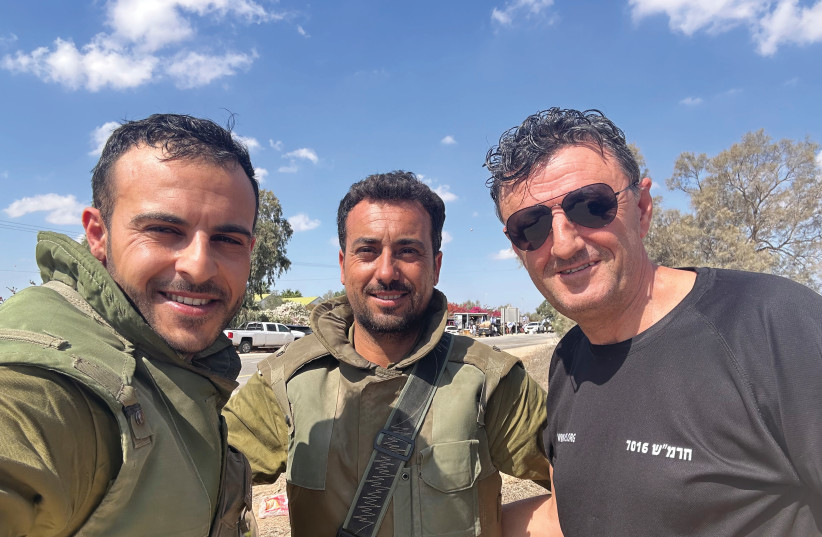
The Druze community in Israel, currently numbering approximately 130,000, has always been very loyal to the Jewish state, with close to 90% of its young men serving in the IDF.
In fact, although the State Defense Act of 1949 allowed for exemptions for minorities, the Druze had declined to accept it. The “covenant of blood” is a term commonly used to describe the bond between Jewish and Druze IDF soldiers. Since the establishment of the state, close to 500 Druze soldiers have fallen.
Koftan Halabi, a prominent Druze leader and founder of the Technological Institute for the Empowerment of the Druze Soldier, was among a dozen recipients of the 2023 Volunteer Award from President Isaac Herzog last June. In recent years, Halabi has led what might be described as a technological revolution in his community, helping young Druze men and women succeed professionally, particularly in business and technology. These loyal citizens have been progressing at a much slower pace in these fields than the majority of the population, largely due to a lack of connections and fewer opportunities.
“This is not due to discrimination,” Halabi said. “Israel is not a racist state. Our children just fall through the cracks.”
The founding of the institute “is an exciting step, but for me it’s just the beginning of the road,” he said upon receiving the award.

Ultimately, this achievement will also help fight the anti-Israel Boycott, Divestment and Sanctions campaign (BDS), Halabi said in an interview with the Magazine this week.
Indeed, Halabi, who has worked in the Prime Minister’s Office and served as a senior adviser to government ministers and lawmakers, said that improving hasbara – public diplomacy for Israel – is a major goal of his community for 2024. The Druze Veterans Association for the Advancement of the Israeli-Druze Soldier – which, starting in 2017, was chosen to represent Israel globally against BDS – is leading this effort with the establishment of the Hasbara War Room.
AS THE association explains in its literature, “The establishment of the technological institute for empowering Druze soldiers is perfectly aligned with the national mission declared by the State of Israel, and reflects the association’s aspiration to act significantly to reduce the economic and social gaps that exist among minority communities and the Jewish public” regarding higher education and integration into the economy and industry, especially in various hi-tech and technology fields.
The War Room “will focus on responding to and confronting negative publications and propaganda related to the State of Israel during the ongoing Israel-Hamas war.”
How will the Druze hasbara War Room help Israel amid the war with Hamas?
The goals of the War Room are to legitimize the actions of the State of Israel on the world stage, to counter misinformation, to strengthen Israel’s image, and to establish trust and reliability. The latter will be done by ensuring that all content is factually accurate, supported by evidence, and authentically presented.
The War Room will focus on targets that are essential in shaping global opinion, including but not limited to international media, policymakers, influencers, and academics. One means will be to create videos and posts on social media – backed by facts – that present the State of Israel in a positive light and combat false information and distortions spread by Israel’s enemies.
A unique advantage is that the Druze are Arabic speakers. Since the project is operated by that community, the content will be presented in both Arabic and English. Parenthetically, Halabi told the Magazine that as the younger generation becomes more integrated, they often mix Hebrew with Arabic while speaking among themselves.
However, he emphasized that a priority for his community is a change in the Nation-State Law, noting that to date, seven Druze fighters have died in the current war with Hamas, including two senior officers. Most recently, on January 2, Sergeant Sufyan Khaled Dazf, 21, lost his life in a battle in the northern Gaza Strip. An only son, he was known for his insistence on enlisting in combat service.
“There must be a change,” Halabi stressed: “The Druze walked with Israel for more than 100 years, and they must get the same privileges.”
IN JULY 2018, the Knesset passed the controversial Basic Law: Israel as the Nation-State of the Jewish People by a vote of 62-55, with two abstentions. According to the law, “the Land of Israel is the historical homeland of the Jewish People, in which the State of Israel was established; the State of Israel is the nation state of the Jewish People in which it realizes its natural, cultural, religious, and historical right to self-determination,” and “the realization of the right to national self-determination in the State of Israel is exclusive to the Jewish People.”
In November, the government promised to create a Basic Law to promote the status of the Druze, although it would not cancel the Nation-State Law. Foreign Minister Eli Cohen and parliamentary whip Ofir Katz stated, “In the coming days, we will promote a draft Basic Law for the Druze community, which aims to anchor the important status of the Druze community in the State of Israel.”
Prime Minister Benjamin Netanyahu stated that “the Druze are a valued community; they fight, they fall. We will give them everything they deserve. We’ll find the ways to do this; it’s essential.”
In mid-December, Halabi hosted Ronen Tzur, a spokesperson for the Headquarters of the Families of the Hostages and Missing Persons, along with 300 guests and volunteers from all over the world for a special meal that included a variety of delicacies from Druze cuisine.
Halabi explained that his community “wanted to ease even a little the pain of the families” and to provide encouragement. He brought with him 10,000 flags decorated with both the Star of David and the symbol of the Druze community, which were distributed to passersby. ■
